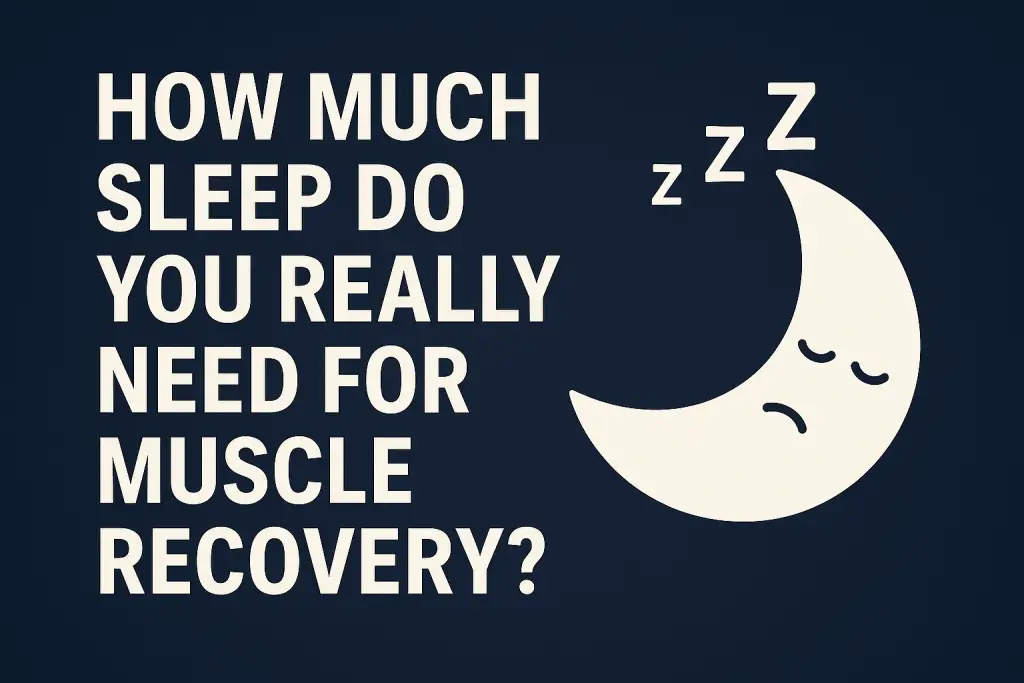How Much Sleep Do You Really Need for Muscle Recovery?

If there’s one recovery strategy that every lifter should know, it’s this:
You cannot out-train poor sleep.
Sleep is the foundation of recovery — far more powerful than any supplement, fancy massage gun, or cold plunge. It’s during sleep that your body repairs muscle tissue, replenishes glycogen, balances hormones, and resets your nervous system. Without adequate sleep, your strength training results will eventually stall.
But how much sleep do you really need to maximize muscle recovery? Let’s break it down.
Why Sleep Matters for Strength Training Recovery
Every time you lift heavy, you’re creating micro-tears in muscle fibers. That damage triggers a cascade of biological repair processes — but those processes don’t happen efficiently while you’re awake. Most muscle repair, tissue rebuilding, and growth hormone release occur while you sleep.
During deep sleep stages (slow-wave sleep), your body:
- Boosts muscle protein synthesis
- Releases growth hormone
- Regulates testosterone and cortisol balance
- Restores central nervous system fatigue
- Recharges glycogen stores in the muscles
Without enough sleep, not only will your muscles struggle to recover, but your nervous system won’t fully reset, making your next heavy session feel harder than it should.
The General Sleep Guidelines for Lifters
For most lifters, here’s a solid starting point:
| Training Status | Sleep Need |
|---|---|
| Sedentary or light exercise | 7–8 hours |
| Regular strength training (3-4x/week) | 8–9 hours |
| Heavy training or competitive athlete | 9–10 hours |
Simply put: The harder you train, the more you need to sleep.
Factors That Affect Your Sleep Needs
Not everyone needs the exact same number of hours. Your optimal recovery sleep depends on several variables:
- Training volume and intensity (more sets, heavier loads = more recovery needed)
- Age (older lifters often need slightly more sleep)
- Stress levels (life stress adds to recovery load)
- Nutrition (poor nutrition can increase recovery demands)
- Sleep quality (interrupted sleep means you need more total time)
If your sleep is poor quality (frequent wake-ups, restlessness, sleep apnea), you may require even more hours to get adequate recovery.
Signs You May Not Be Sleeping Enough for Recovery
As a strength coach, these are the signs I watch for in clients:
- Constant soreness, even after light workouts
- Strength plateaus or regressions
- Poor motivation to train
- Irritability, mood swings, or increased anxiety
- Needing excessive caffeine to function
- Struggling to fall or stay asleep
If you’re experiencing multiple of these consistently, there’s a good chance your recovery is compromised — and sleep is often the root cause.
Quick Sleep Tips for Strength Athletes
If you want to optimize sleep for better muscle recovery, focus on:
1️⃣ Consistent schedule – Same bedtime and wake time daily
2️⃣ Dark, cool room – Optimal sleep temperature is 65–68°F
3️⃣ Limit screens 60 minutes before bed – Blue light disrupts melatonin
4️⃣ Protein before bed – Slow-digesting protein (casein) may support overnight recovery
5️⃣ Manage caffeine – Avoid intake 6–8 hours before bedtime
6️⃣ Wind-down routine – Light stretching, reading, or breathwork before bed
Should You Nap to Catch Up?
Yes — strategically.
Short 20–30 minute naps can help reduce sleep debt and promote better recovery between heavy training sessions. But naps are a supplement, not a replacement for full nightly sleep.
Final Thoughts
If you’re serious about strength training results, you need to be just as serious about your sleep.
Most lifters are under-sleeping. They’re chasing supplements, complicated programming tweaks, and expensive gadgets when the most effective recovery tool is entirely free.
As a coach, I see it constantly: when athletes finally commit to 8–9 hours of consistent, high-quality sleep, progress accelerates dramatically.
Prioritize sleep. Build your schedule around it. Protect it like you protect your training sessions.
Sleep is your recovery multiplier.
Next Step
If you want a simple way to estimate your personal recovery needs based on your training and lifestyle, try our free Sleep Recovery Calculator — it gives you a personalized recommendation based on your current workload.